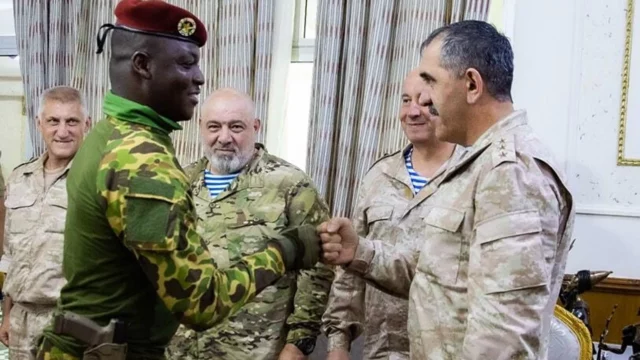
Brief: Russia Deepens Counter-Terrorism Ties to Sahelian Post-Coup Regimes
Publication: Terrorism Monitor Volume: 21 Issue: 24
By:

On December 4, Niger announced the “strengthening of military cooperation” with Russia, the latest in a series of shifts toward the Russian sphere of influence by post-coup Sahelian states on the basis of counter-terrorism (Africa News, December 4). The announcement came after a Russian delegation visited Bamako, Mali and met with the post-coup military leaders of Burkina Faso, Mali, and Niger to discuss establishing a federation that would be known as the “Alliance des États du Sahel” (AES, or Alliance of Sahel States) (Sahara Reporters, December 4). Along with Mauritania and Chad, these same three countries had previously been part of the G5 Sahel, the French-led Sahelian regional security alliance. Mali withdrew from the group first, in May 2022. One month later, Niger and Burkina Faso withdrew from the G5 Sahel as well. It is now only a question of when, not if, Chad and Mauritania will also withdraw and effectively end the once-strong G5 Sahel “anti-jihadist” alliance (rfi.fr, December 7).
The G5 Sahel was primarily directed against the al-Qaeda-affiliated Group for Supporters of Islam and Muslims (JNIM) and Islamic State in Sahel Province (ISSP), which is also known informally as Islamic State in Greater Sahara (ISGS). However, the AES appears more likely to be about regime preservation than countering terrorism. Its purpose, for example, is to require each country to support the others, including militarily, in the case of an invasion of any one of them by an external force (Al Jazeera, September 16). Since the military coup in Niger in July—which followed those of Mali and Burkina Faso—the three AES countries have feared an Economic Community of West African States (ECOWAS) invasion of Niger, although Nigeria’s reluctance has to date put to rest any prospects of an imminent invasion (see Terrorism Monitor, September 15).
Nevertheless, Niger and the other two AES countries still remain concerned that some form of invasion will take place. Niger, for example, increased the number of troops on its border with Benin, after alleging that Benin was planning to invade Niger alongside ECOWAS (TASS, August 17; Africa News, September 13). The two countries have a border dispute that dates back to the 1960s, but an actual Beninese invasion appears extremely unlikely. It is, however, this very paranoia about potential invasions or counter-coups against the juntas in Niger, Mali, and Burkina Faso that is driving the three AES countries closer to Russia.
The AES will become more than just a Russian-backed security pact, with Moscow offering to provide grain and agricultural-technical expertise to the three Sahelian states (TASS, August 16). The primary function of the grouping will ostensibly be counter-terrorism, with Wagner Group troops leading the way. As a result, Wagner has become a key target of both JNIM and ISGS, with former often considering the Malian army and Wagner as a unified entity (X/@G88Daniele, July 28, 2022).
Notwithstanding Wagner troops’ combat experience, they number only several hundred in the region, and their lack of knowledge of the Sahelian human terrain make it unlikely they will have a significant impact against jihadist forces. The ultimate beneficiaries of the AES, therefore, are Russia’s political class, which can portray Russia as gaining newfound influence at the expense of the West in Africa. The post-coup Sahelian regimes, for their part, also expect to benefit from Russian and Wagner protection in the case of any civilian uprising or internal military challenges.



